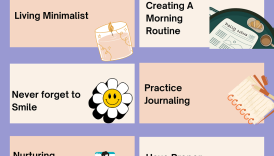Healthy Habits to Adopt for a Vibrant Life in Logan

In today’s fast-paced world, cultivating healthy habits has become essential for leading a fulfilling life. Many individuals often overlook this vital aspect, but embracing a lifestyle focused on well-being can create significant positive changes.
- Healthy Habits to Adopt for a Vibrant Life in Logan
- The Journey Begins
- Importance of Healthy Habits
- Physical Well-being
- Mental Health Benefits
- Proper Nutrition
- Balanced Diet
- Meal Planning
- Regular Exercise
- Cardiovascular Workouts
- Strength Training
- Sufficient Sleep
- Sleep Hygiene
- Relaxation Techniques
- Hydration
- Benefits of Water
- Hydrating Foods
- Stress Management
- Mindfulness Practices
- Stress-Relief Activities
- Social Connections
- Building Relationships
- Community Engagement
- Time Management
- Prioritizing Tasks
- Setting Boundaries
- Personal Development
- Continuous Learning
- Self-Reflection
- Outdoor Activities
- Nature Walks
- Outdoor Sports
- XII. Mental Stimulation
- Brain Games
- Creative Hobbies
- XIII. Regular Health Check-ups
- Preventive Screenings
- Doctor Consultations
- XIV. Mind-Body Connection
- Meditation
- Yoga Practice
- XV. Conclusion
- Key Takeaways
The Journey Begins
Think about the last time you felt truly energized and content. Often, it’s during those moments when we prioritize our well-being. Developing healthy habits doesn’t have to feel overwhelming. To make it easier to incorporate these practices into daily life, consider the following:
- Identify personal goals
- Start with small changes
- Celebrate progress
This journey towards a healthier lifestyle is not just a routine but a lifestyle shift that positively enriches every facet of life.
Importance of Healthy Habits
Embracing healthy habits is crucial not just for physical vitality but also for enhancing overall happiness and life satisfaction. When individuals prioritize their well-being, they foster a holistic improvement that encompasses their body and mind.
Physical Well-being
Physical health serves as the foundation for a vibrant life. Regular activity, nutritious foods, and proper sleep help maintain energy levels and promote longevity. Personal stories illustrate this: for instance, after dedicating time to daily workouts and balanced meals, many experience increased stamina and vitality. Consider the impacts of good physical habits:
- Improved immune function
- Better weight management
- Enhanced mobility
Mental Health Benefits
Furthermore, healthy habits provide substantial mental health benefits. Regular exercise not only releases endorphins, which act as natural mood lifters, but also helps reduce anxiety and stress. Take, for example, someone who starts a daily walk amidst nature; not only do they enjoy physical activity, but they also find solace in the tranquility around them, leading to a clearer mind and better emotional health. Key benefits include:
- Reduced symptoms of depression
- Improved cognitive function
- Higher resilience to stress
When combined, these physical and mental boosts create a synergistic effect, underscoring why healthy habits are indispensable in our lives.
Proper Nutrition
Having established the significance of healthy habits, proper nutrition emerges as a cornerstone of well-being. A commitment to nourishing the body plays a vital role in physical health and mental clarity, fostering a more vibrant life.
Balanced Diet
A balanced diet ensures the body receives essential nutrients necessary for optimal functioning. This means incorporating a variety of food groups—fruits, vegetables, whole grains, proteins, and healthy fats. For example, I noticed a remarkable difference in my energy levels when I began including colorful vegetables in my meals. To keep balanced meals in mind, consider:
- Fruits and Vegetables: Aim for a rainbow of colors
- Whole Grains: Opt for brown rice, quinoa, and whole-grain bread
- Lean Proteins: Include fish, chicken, beans, and legumes
- Healthy Fats: Use avocados, nuts, and olive oil
Meal Planning
Another key aspect is meal planning, which can simplify the process of eating healthy. By dedicating some time each week to plan meals, I’ve found that I waste less food and make better choices. Steps for effective meal planning include:
- Setting a Menu: Choose recipes for the week ahead
- Grocery List: Create a shopping list based on your menu
- Batch Cooking: Prepare larger portions to save time on busy days
By committing to a balanced diet and meal planning, individuals can ensure they are fueling their bodies appropriately, leading to improved energy, mood, and overall health.
Regular Exercise
Transitioning from proper nutrition, regular exercise is equally essential for maintaining a healthy lifestyle. Engaging in physical activities not only enhances physical fitness but also uplifts the spirit, creating a robust mind-body connection.
Cardiovascular Workouts
Cardiovascular workouts are a fantastic way to boost heart health and burn calories. Activities like running, cycling, or dancing elevate the heart rate and improve endurance. Personally, I’ve found that starting my day with a brisk 30-minute jog sets a positive tone for the rest of the day. Consider these benefits of cardiovascular exercises:
- Improved heart and lung health
- Enhanced mood through endorphin release
- Increased stamina for daily activities
Strength Training
On the other hand, strength training focuses on building muscle mass, which is vital for overall body strength and metabolism. Incorporating weights or resistance bands into your routine can lead to significant benefits. I remember the first time I lifted weights; not only did I feel stronger physically, but my confidence soared as well. Key benefits of strength training include:
- Boosted metabolism, aiding weight management
- Enhanced bone health and joint stability
- Improved posture and balance
By incorporating both cardiovascular workouts and strength training into a regular exercise routine, individuals can create a balanced fitness approach that supports both physical and mental well-being.
Sufficient Sleep
Continuing from the importance of regular exercise, sufficient sleep plays a pivotal role in overall health. A well-rested body not only recharges but also supports physical performance, cognitive function, and emotional resilience.
Sleep Hygiene
Practicing good sleep hygiene can dramatically improve sleep quality. This means creating an environment conducive to rest and establishing consistent sleep routines. I recall how my nights transformed when I started using blackout curtains and avoiding screens before bedtime. Key sleep hygiene tips include:
- Consistent Schedule: Go to bed and wake up at the same time daily
- Comfortable Environment: Keep the bedroom cool and dark
- Limit Caffeine and Heavy Meals: Avoid these close to bedtime
Relaxation Techniques
In addition to sleep hygiene, incorporating relaxation techniques can help calm the mind before sleep. Techniques like deep breathing or guided meditation help set the stage for restful slumber. Consider these methods:
- Deep Breathing Exercises: Focus on slow and deep breaths
- Progressive Muscle Relaxation: Tense and then relax each muscle group
- Meditation or Mindfulness: Spend a few minutes focusing your mind
By prioritizing sufficient sleep through hygiene practices and relaxation techniques, individuals can significantly enhance their quality of life, leading to better focus, mood, and overall health.
Hydration
Building on the significance of sufficient sleep, hydration is another critical component of maintaining optimal health. Staying well-hydrated can improve energy levels, support digestion, and enhance cognitive function.
Benefits of Water
Water is truly the elixir of life. Drinking enough water has numerous benefits that can transform how you feel daily. I often notice that my productivity dips when I forget to hydrate, reinforcing the need to keep a water bottle nearby. Key benefits of drinking water include:
- Increased Energy: Helps combat fatigue and enhances mental alertness
- Aids Digestion: Facilitates nutrient absorption and prevents constipation
- Temperature Regulation: Keeps the body’s temperature stable during physical activity
Hydrating Foods
In addition to drinking water, consuming hydrating foods can also contribute to overall hydration. Many fruits and vegetables are high in water content and provide essential nutrients. For instance, my afternoon snack is often a bowl of cucumber and watermelon—refreshing and hydrating! Here are some hydrating foods to consider:
- Watermelon: Contains about 92% water
- Cucumbers: Perfect for snacking with 95% water content
- Oranges: Juicy and rich in Vitamin C, about 86% water
- Strawberries: Delicious and hydrating at approximately 91% water
By prioritizing hydration through both water intake and hydrating foods, individuals can significantly boost their health and maintain energy levels throughout the day.
Stress Management
Transitioning from the importance of hydration, stress management is essential for maintaining both mental and physical well-being. Learning to manage stress effectively can lead to a healthier, more balanced life.
Mindfulness Practices
Incorporating mindfulness practices is a powerful way to combat stress. Mindfulness involves being present in the moment and fully engaging with your surroundings. I remember the first time I practiced mindfulness meditation; I felt an immediate wave of calm wash over me. Consider these mindfulness techniques:
- Breathing Exercises: Focus on your breath for a few minutes to center yourself
- Body Scan: Gradually tune into different parts of your body, noticing tension or discomfort
- Gratitude Journaling: Write down three things you’re grateful for each day to shift your mindset
Stress-Relief Activities
In addition to mindfulness, engaging in stress-relief activities can help alleviate tension. Whether it’s a favorite hobby or physical exercise, finding time for enjoyable activities can have a profound impact. Personally, I find that painting or taking a walk in nature helps me unwind. Some effective stress-relief activities include:
- Exercise: Release those endorphins by going for a run or joining a dance class
- Creative Outlets: Explore painting, writing, or crafting
- Nature Time: Spend time outdoors, which can lower stress levels significantly
By prioritizing stress management through mindfulness and engaging in stress-relief activities, individuals can create a more peaceful and fulfilling life.
Social Connections
Continuing from the topic of stress management, fostering social connections plays a vital role in enhancing overall well-being. Strong relationships not only provide emotional support but also contribute to a sense of belonging.
Building Relationships
Building meaningful relationships takes effort but can be incredibly rewarding. I recall how reconnecting with an old friend transformed my outlook on life. Regular catch-ups can uplift spirits and strengthen bonds. To cultivate relationships, consider these strategies:
- Regular Communication: Schedule weekly check-ins, be it a phone call or coffee date
- Shared Interests: Join clubs or groups focused on activities you love
- Express Appreciation: Simple gestures like a thank-you note can deepen connections
Community Engagement
In addition to personal relationships, community engagement is a wonderful way to foster social connections. Volunteering or participating in community events not only helps others but also broadens your social network. For instance, I found joy in joining a local community garden project, where I met like-minded individuals passionate about sustainability. Ways to engage with your community include:
- Volunteering: Choose causes that resonate with you
- Attending Local Events: Participate in fairs, workshops, or festivals
- Joining Clubs: Engage with groups that align with your interests or hobbies
By prioritizing social connections through relationship-building and community involvement, individuals can enhance their emotional health, reduce stress, and create a more fulfilling life experience.
Time Management
As we transition from discussing the importance of social connections, effective time management becomes vital in maintaining balance and achieving personal and professional goals. When individuals manage their time well, they can reduce stress and enhance productivity, leading to a more satisfying life.
Prioritizing Tasks
The first step in effective time management is prioritizing tasks. I often use the Eisenhower Matrix to help me distinguish between urgent and important tasks. This simple tool allows me to focus on what truly matters. To effectively prioritize, consider these tips:
- List Tasks: Write down everything that needs to be done
- Categorize: Sort tasks into urgent, important, and less important
- Daily Goals: Focus on three major tasks to complete each day
Setting Boundaries
Another crucial aspect of time management is setting boundaries. Learning to say no and allocate time for personal commitments is essential. At one point, I found myself overwhelmed by commitments until I started clearly defining my limits. Here are some strategies for setting boundaries:
- Establish Office Hours: If working from home, define clear work times
- Communicate Needs: Share your availability with friends and family
- Limit Distractions: Set aside specific times for checking emails and social media
By prioritizing tasks and setting boundaries effectively, individuals can take control of their time, reduce stress, and create a more balanced, fulfilling lifestyle.
Personal Development
Continuing from the importance of time management, personal development is an ongoing journey that enriches our lives and helps us reach our fullest potential. Embracing continuous learning and self-reflection can significantly enhance this journey.
Continuous Learning
Continuous learning is about staying curious and open to new experiences. I once decided to take an online course on a subject I knew little about, and it reignited my passion for learning. Engaging in new educational experiences helps us adapt and grow. To embrace continuous learning, try:
- Online Courses: Platforms like Coursera or Udemy offer countless topics
- Podcasts and Audiobooks: These can be easily consumed during commutes
- Workshops and Seminars: Attend events related to your interests
Self-Reflection
Self-reflection complements learning by allowing us to analyze our experiences and grow from them. Taking time to reflect has been transformative for me; it helps clarify my goals and values. Consider these techniques for self-reflection:
- Journaling: Write about daily experiences and emotions
- Mind Mapping: Visualize your thoughts and ideas on paper to explore options
- Meditation: Focused time to think deeply about your actions and choices
By committing to personal development through continuous learning and self-reflection, individuals can cultivate a deeper understanding of themselves, embrace change, and create a meaningful life.
Outdoor Activities
Moving forward from personal development, outdoor activities provide an excellent way to enhance well-being while connecting with nature. Engaging in these activities can recharge our minds and bodies, fostering a sense of community and adventure.
Nature Walks
Nature walks are one of the simplest and most rewarding outdoor activities. I often find that a stroll through a nearby park or forest clears my mind and invigorates my spirit. The sounds of chirping birds and rustling leaves create a perfect backdrop for relaxation. To make the most of nature walks, consider:
- Choosing Scenic Routes: Look for trails with beautiful landscapes
- Mindfulness: Take time to notice the sights and sounds around you
- Walking Groups: Invite friends or join a local hiking club
Outdoor Sports
In addition to leisurely walks, participating in outdoor sports can boost fitness levels and build social connections. From soccer to ultimate frisbee, outdoor sports can be both fun and challenging. The camaraderie formed during games can turn acquaintances into lifelong friends. Here are some popular outdoor sports to try:
- Running Clubs: Join groups that gather for regular runs
- Team Sports: Engage in sports like basketball, soccer, or softball
- Adventure Activities: Explore rock climbing, kayaking, or mountain biking
Embracing outdoor activities like nature walks and sports not only enhances physical health but also cultivates mental well-being, reminding us of the beauty and joy in movement and nature.
XII. Mental Stimulation
Continuing from the invigorating world of outdoor activities, engaging in mental stimulation is crucial for maintaining cognitive health and enhancing creativity. Keeping the mind active not only improves focus but also enriches overall well-being.
Brain Games
Brain games are a fun way to challenge the mind. Personally, I enjoy solving crossword puzzles or playing Sudoku during my coffee break. These activities sharpen problem-solving skills and improve memory. Here are some popular brain games to try:
- Puzzles: Engage with jigsaw puzzles or logic puzzles
- Memory Games: Try card-matching games to boost recall
- Online Brain Training: Apps like Lumosity offer interactive challenges
Creative Hobbies
In addition to brain games, exploring creative hobbies can foster mental stimulation. Whether it’s painting, writing, or learning a musical instrument, these activities allow for self-expression and mental exercise. I’ve found that taking up watercolor painting renewed my creativity and provided a wonderful outlet for relaxation. Consider these creative hobbies:
- Drawing or Painting: Express emotions visually through art
- Writing: Start journaling or creative writing to explore new ideas
- Crafting: Engage in activities like knitting or DIY projects
By incorporating brain games and creative hobbies into daily routines, individuals can nurture their minds, making life more vibrant and enjoyable.
XIII. Regular Health Check-ups
Transitioning from the realm of mental stimulation, regular health check-ups are crucial for maintaining overall well-being. Staying proactive about health can lead to early detection of issues and better long-term outcomes.
Preventive Screenings
Preventive screenings are essential for catching potential health problems before they escalate. I remember the peace of mind I felt after scheduling my annual screenings, knowing I was taking charge of my health. For adults, these screenings can include:
- Blood Pressure Checks: Regular monitoring to prevent heart disease
- Mammograms: Essential for breast cancer detection in women
- Colonoscopy: Important for colorectal cancer prevention in adults over 45
Doctor Consultations
Regular doctor consultations also play an integral role in maintaining health. Not only can they address existing concerns, but they also provide an opportunity for guidance on wellness strategies. Exploring topics like nutrition or exercise with your physician can be incredibly beneficial. To maximize doctor visits, consider:
- Preparing Questions: Write down concerns or topics you’d like to discuss
- Keeping Records: Track any symptoms or changes in your health
- Follow-up Appointments: Stay consistent with follow-ups for ongoing health management
By prioritizing regular health check-ups through preventive screenings and consultations, individuals can take critical steps towards a healthier future, ensuring that they are well-equipped to address their health needs.
XIV. Mind-Body Connection
Building upon the importance of regular health check-ups, cultivating a strong mind-body connection is essential for holistic well-being. Developing this connection can significantly enhance emotional resilience and physical health.
Meditation
Meditation is a powerful tool for strengthening the mind-body connection. Personally, I find that dedicating just ten minutes each morning to meditate has transformed my day, allowing me to approach challenges with clarity and calmness. To get started with meditation, consider these tips:
- Find a Quiet Space: Choose a peaceful area free from distractions
- Focus on Breath: Pay attention to your breathing—this anchor helps calm the mind
- Guided Sessions: Use apps like Headspace or Calm for guided meditations
Yoga Practice
Similarly, yoga is an excellent way to unify mind and body. The combination of physical movement, breath control, and meditation creates a holistic approach to fitness and relaxation. I remember feeling a profound sense of peace after participating in a yoga class focused on mindfulness. Here are some benefits of incorporating yoga practice:
- Increased Flexibility: Regular practice helps improve overall flexibility
- Stress Reduction: The calming postures and breathing techniques alleviate tension
- Improved Focus: Mindful movement enhances concentration and mental clarity
By engaging in practices like meditation and yoga, individuals can nurture a deep mind-body connection, leading to improved health, reduced stress, and a more fulfilling life experience.
XV. Conclusion
As we wrap up our exploration of the various elements that contribute to a healthy lifestyle, it’s clear that prioritizing well-being through mindful practices yields profound benefits. From maintaining social connections to engaging in outdoor activities, each aspect interlinks to create a holistic approach to health.
Key Takeaways
Reflecting on this journey, consider adopting a few practices that resonate with you:
- Embrace Regular Check-ups: Stay proactive about your health
- Engage in Mind-Body Practices: Try meditation or yoga to enhance mental clarity
- Stay Active: Incorporate outdoor activities to boost physical fitness
Personal growth is a continuous journey, and by integrating these habits into daily life, individuals can create a vibrant, fulfilling experience that promotes overall well-being. Remember, every small step taken towards health is a step towards a happier life.





